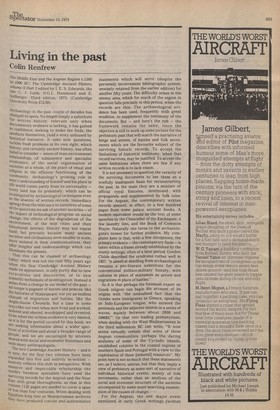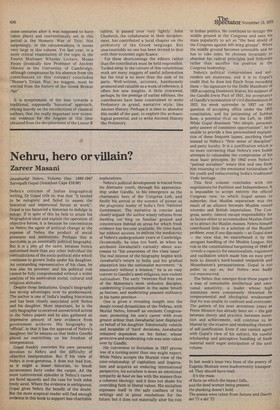Living in the past
Colin Renfrew
The Middle East and the Aegean Region c. 1380 to 1000 BC: The Cambridge Ancient History volume II Part 2 edited by I. E. S. Edwards, the late C. J. Gabb, N.G.L. Hammond and E. Sollberger. Third edition, 1975. (Cambridge University Press £12.50) Archaeology in the past couple of decades has Changed its spots. No longer simply a substitute for written history, relevant only when documentary evidence is lacking, it has gained in confidence, seeking to make the finds, the artefacts themselves, yield a story unbiased by historical narrative. It asks new questions, tackles fresh problems in its own right, which history, and certainly ancient history, has often failed to consider — issues of man-environment relationships, ,of subsistence and specialist economies, of the social organisation of societies as a whole, of the place of ritual and religion in the efficient functioning of the Community. Archaeology's growing role in man's understanding of himself and his place in the world comes partly from its universality — every land has its prehistory, which can be investigated by archaeological techniques even in the absence of written records. Immediacy Springs from the relevance to ourselves of some Of the questions we ask of ancient societies — of the impact of technological progress on social Change, the effects of the degradation of the environment, of the way cities and their hinterlands interact. History may not repeat itself, but precisely because many ancient societies and civilisations were smaller in scale, more isolated in their communications, they Offer insights and understandings which can illuminate the present. That this can be claimed of archaeology today, which was not the case fifty years ago When the first Cambridge Ancient History made its appearance, is only partly due to new excavations and discoveries, or to new scientific techniques of investigation. Instead it arises from a change in our model of the past — no longer a pageant of heroes and princes, like the histories of Shakespeare, nor yet an endless Charade of migrations and battles, like the Anglo-Saxon Chronicle, but a time in some ways like our own when men lived and worked, ordered and obeyed, worshipped and invented, Even when the written evidence is very limited, as it is for the period covered by this book, we are seeking information about a wider spectrum of activities and about a broader range of People, and we are encouraged by interests Shared with social and economic historians and With many anthropologists. The new Cambridge Ancient History — and it is new, for the first two volumes have been expanded into five and entirely re-written — scarcely reflects this shift in perspective. With massive and impeccable scholarship the world's foremost specialists have used the surviving records for the Aegean and the Near East with great thoroughness, so that in this volume 1128 pages are needed to cover a span of less than four centuries. When dealing with EgYptian king lists or Mesopotamian archives they have produced concise and authoritative statements which will serve (despite the perversely inconvenient bibliographic system, unwisely retained from the earlier edition) for another fifty years. The difficulty arises in the uneasy area, which for much of the region in question falls precisely in this period, when the records are thin. The archaeological evidence has been used, frequently with great erudition, to supplement the testimony of the documents. But — and here's the rub — the framework remains the same, since the objective is still to work up some picture for the prehistoric past that will match the narrative of kings and armies, of battles and folk movements which are the favourite subject of the surviving historic records. To accept the limitations of historical testimony, when that record survives, may be justified. To accept the same limitations when there are few if any written records is to lack vision.
It is not necessary to question the veracity of the surviving documents to see them as a woefully inadequate basis for reconstructing the past. In the main they are a mixture of official royal histories, intermixed with propaganda and supplemented by folk tales. For the Aegean, the contemporary written records amount, in effect, to a few hundred pages from some palace account books. A modern equivalent would be the text of some speeches by the Chancellor of the Exchequer, a few laundry lists, and the Book of Common Prayer. Naturally one turns to the archaeologists's trowel for further evidence. My complaint here is that, with a few exceptions, the primary evidence — the contemporary finds — is taken within a frame already established by the scanty writings, often of a later period. Gordon Childe described the syndrome rather well in 1957: "it aimed at distilling from archaeological remains a pre-literate substitute for the conventional politico-military history, with cultures in place of statesmen as actors and migrations in place of battles."
So it is that perhaps the foremost expert on Greek religion can begin his account of its origins with "the undoubted fact that the Greeks were immigrants to Greece, speaking an Indo-European tongue, who entered the peninsula and the adjacent islands in a series of waves, mainly between about 2000 and 1000BC". Or that two leading prehistorians, when dealing with the West Mediterranean in the third millennium BC can write, "It now seems virtually certain that some of these Aegean communities, perhaps the daring seafarers of some of the Cycladic islands, established colonies in the coastal regions of southern Spain and Portugal with a view to the exploitation of these [mineral] resources". My point here is not so much that these statements are, as I believe, untrue, but that they imply a view of prehistory as some sort of narrative of individual historical events, mainly of folk movements, rather than an analysis of the social and economic structure of the societies accompanied by some more searching examination of the causes of change.
For the Aegean, the one major event mentioned in early Greek writings (written some centuries after it was supposed to have taken place) and conventionally set in this period -is the Homeric War of Troy. Not surprisingly, in the circumstances, it looms very large in this volume. Yet last year, in a more critical examination of the topic in the Fourth Mortimer Wheeler Lecture, Moses Finley (ironically now Professor of Ancient History in the University of Cambridge, although conspicuous by his absence from the contributors to this volume) concluded "Homer's Trojan War, we suggest, must be evicted from the history of the Greek Bronze Age".
It is symptomatic of the bias towards a traditional, supposedly 'historical' approach, relying heavily on the recollections of classical authors, that the really important new economic evidence for the Aegean at this time obtained from the decipherment of the Linear B tablets, is passed over very lightly, John Chadwick, the collaborator in their decipherment, has contributed a lucid chapter on the prehistory of the Greek language. But unaccountably no one has been invited to deal with their economic significance.
For these shortcomings the editors rather than the contributors must be held responsible. Tucked away in the corners of this voluminous work are many nuggets of useful information but the total is no more than the sum of its parts. Well-written, accurate, handsomely produced and valuable as a work of reference, it offers few new insights. A little overawed, perhaps, by the prestige of earlier editions, the contributors have been constrained to write Prehistory in grand, narrative style, like Ancient History; Perhaps it is time to abandon this model of the past, to explore the archaeological potential, and to write Ancient History like Prehistory.



































 Previous page
Previous page